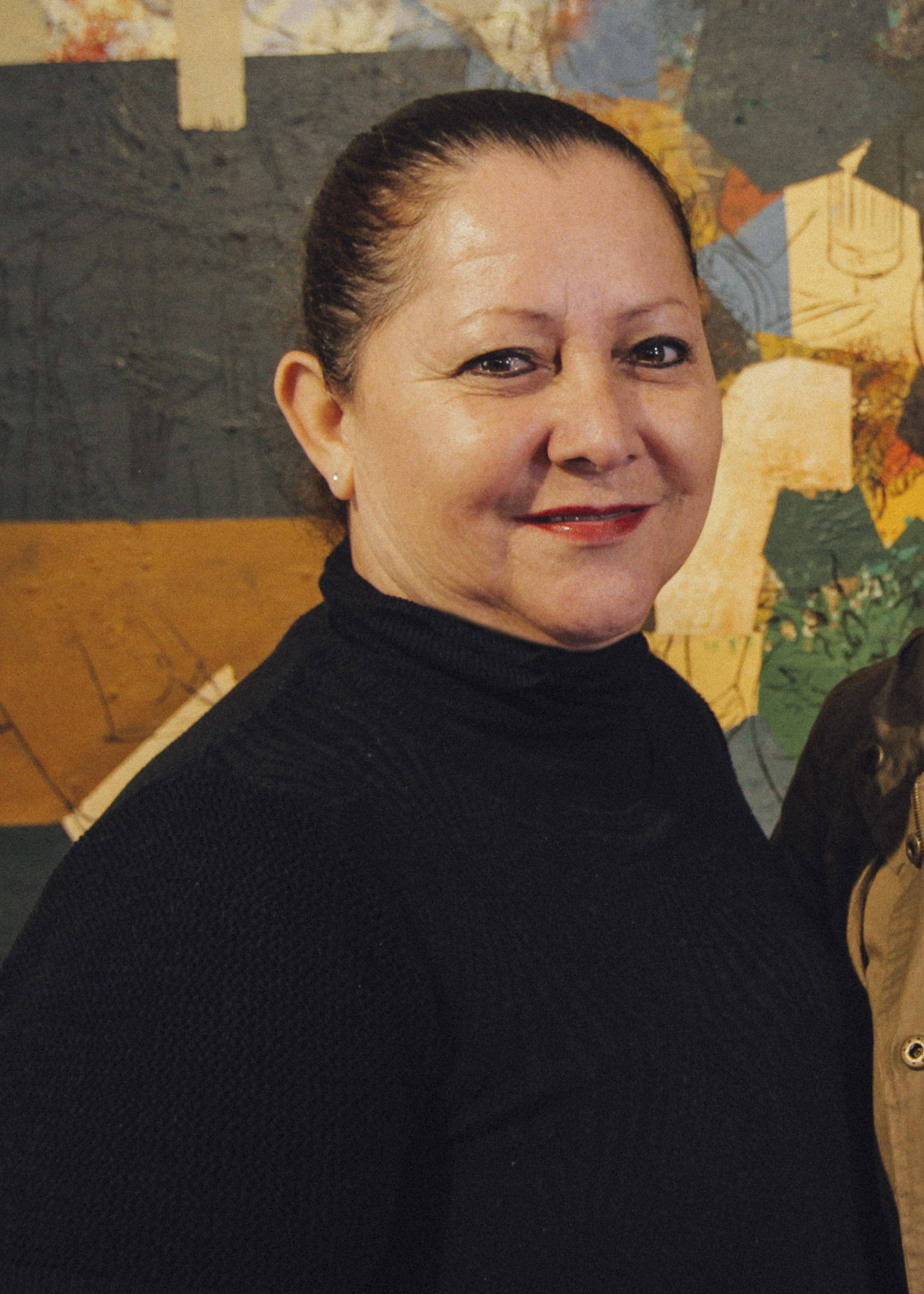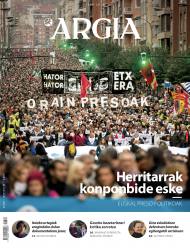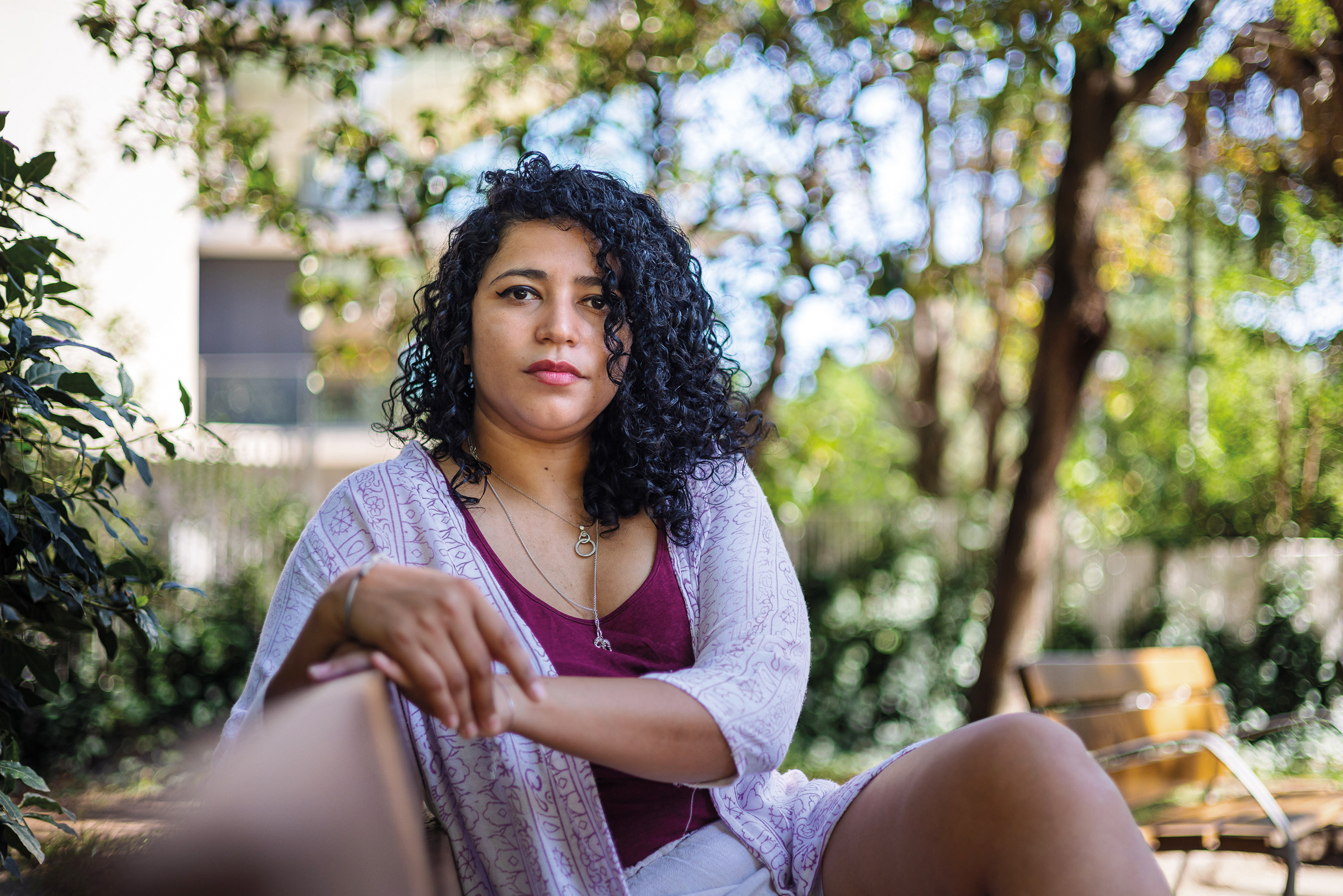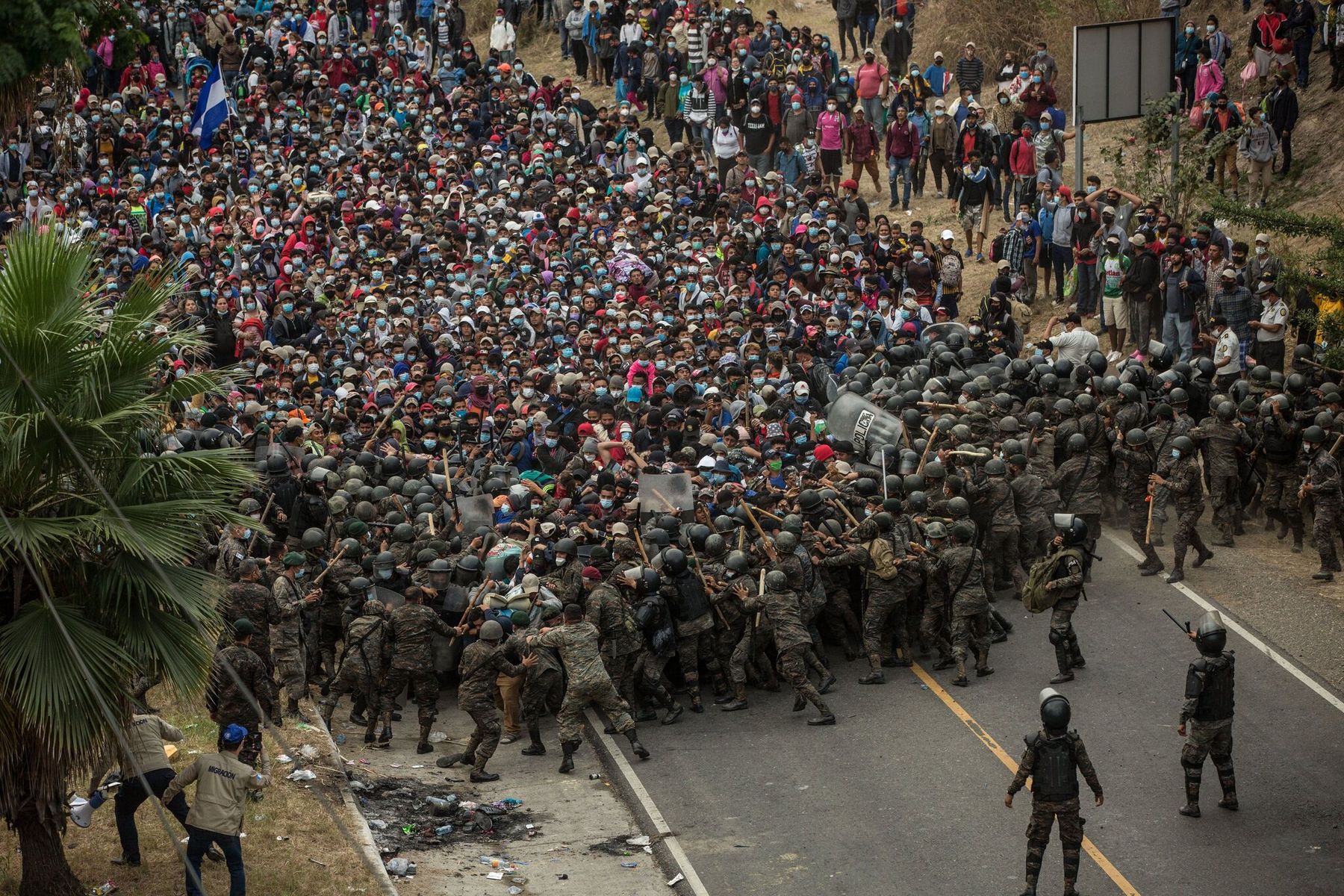"Even though it may last a long time, we have to keep up the fight."
- Honduran Nohemí Esther Pérez Borjas is a human rights defender. In 1982, in the context of the US-driven Doctrine of National Security. United States In South America, Samuel was eliminated. The search for a brother brings him to entrepreneurial activity from a very young age and is currently at risk for fighting in defense of human rights. It has stayed for six months in the Basque Country, within the framework of the Basque Programme of Temporary Protection for Human Rights Defenders.

The meeting was held at the headquarters of the Refugee Assistance Commission (CEAR) in Bilbao, giving way to a long-lasting dialogue. No less, the Honduran has a long way to go as a 36-year-old entrepreneur, and has a backpack full of hopes of suffering on the neck. He looks back and explains the journey he has taken up here, thinking that it will serve to raise awareness of the political situation in Honduras, a task he considers urgent: “Here in Europe, many people don’t even know that Honduras exists. Much less what we are living.”
Pérez was fourteen years old when they made his brother Samuel disappear. In the context of the Cold War, in 1982, the armed forces of several South American countries were engaged in combating anything that might have a revolutionary character through the so-called Doctrine of National Security. To this end, paramilitary groups systematically violated human rights, causing a series of torture, murder and disappearances. Among them was Samuel, 19 years old, who had left for Cuba to form around human rights. “Whoever went to countries like Cuba or Nicaragua was considered a communist, a subversive. As if people had no right to think and have another ideology,” his sister explained. On the return of Cuba, on the border with Guasaul, between Honduras and Nicaragua, Samuel was taken off the bus along with four other young Hondurans he met in Cuba. All five of them disappeared.
"I have had to suffer attacks, threats and persecutions for my political activity, to the point of needing protective measures"
“When my father was following a football match,” they heard of Samuel’s disappearance at home through the radio news, and since then they have not known anything else. The family started looking for their lost partner and eventually realized that they were not the only family members who had disappeared. On 30 November 1982, COFADEH (Committee of Families of Detainees and Missing Persons of Honduras) was established. Since then, Pérez is part of it and has become a human rights defender. “I have been politically trained at COFADEH, but among other things I have had to suffer attacks, threats and harassment from my political activity, to the point of needing protective measures,” he explained. Following the 2009 Military Coup, the Inter-American Commission on Human Rights imposed protection measures on it and, as this risk situation continues, it has remained in the Basque Country for six months.

Difficult political situation
He says that Perez dreams of a beautiful country that, in his words, has been “the dream of Samuel and of all the disappeared.” For this reason, he is eager to return home and join the “process of reorganization of Honduras” to try to reverse the evolution of the country after the coup d’état of 2009. On June 28 of that year, the Honduran Armed Forces kidnapped and exiled the then President, Manuel Zelaya, and the Honduran Congress put Roberto Micheletti at the head of the government until the November elections. The country sank for several weeks in a state of siege and the repression began to cause victims among those who rose up against the coup. On 29 November, he was appointed head of the Profirio Lobo Government of the National Party, the first link followed by the heirs of the coup.
Since he did not like the leftist policy he had been exercising, “with the coup d’état, the coup authorities began to say that Mel (as the citizens call Zelaya) was dangerous. They repeated that Honduras was becoming a communist country like Cuba or Venezuela, and that its relationship with these countries compromised people’s ownership until they were satisfied.” Perez began to recognize that people had come to this idea, and that some of his friends had turned away from him. “I realized the situation was worse than ever,” he says.
“Here in Europe, many people don’t even know that Honduras exists. Much less what we are living.”
In this context, the year 2013 came, and again the elections were held. “They were fraudulent elections, like all those that have taken place from the coup to here,” he said. The winner was Juan Orlando Hernández from the National Party, who had so far remained in office. "This far-right man started cleaning up the state's safe, stole it from social security and, although people continue to pay the fee, there are never drugs. To fill the vacuum, as they own several of their drugstores, they made flour pills that caused more than 3,000 deaths. And on this there is neither an investigation nor a responsible one,” he denounced. “They stole 800 million lempires to pay for another political campaign that had the slogan ‘four more years’,” he says with outrage. Said and done, in the 2017 elections they managed to keep Hernández in power for another four years.
These last elections had their particularity. By then the Alliance of the Opposition to the Dictatorship had already been formed, “and it was known that it had all the triumphs”. But at the end of the voting day, with the counting of the votes underway and the victory of the Alliance, there was a computer shutdown. “At the time we learned what was going to happen, the next day the right announced that it had won,” he explained. In describing the event as electoral fraud, numerous protests and disturbances were recorded on the street among the attendees. The repression of protesters resulted in more than a thousand detainees, hundreds injured and more than 30 deaths. “It’s terrible that you return to the same thing, it can be said that repression has become commonplace in Honduras,” he said. However, he stressed that people have “woken up”: “They were wrong to think that the people would remain silent.”

Defence of human rights, a dangerous act
The political context of the last decade has once again turned criminalization, disappearances and murders into everyday loaves in Honduras. Humble citizens don't have it easy. “Honduras is a country of great impunity, poverty and violence. There is money to buy arms, but not to ensure health, education and food. They've privatized everything. Our lands are on sale for those who make the best offer, the transnational ones are on demand. That’s no small thing, and many public offices, including counsellors, are run by private individuals who have to do with disappearances,” he explained. In the face of this situation, it is considered essential to maintain the defence of human rights, despite their continued criminalization.
“They do not respect human rights defenders, they regard us as enemies. We have over 120 defenders killed and many have had to be exiled. However, some do not want to go abroad in order to be able to remain in the resistance. Whatever happens, they are keen to keep fighting in their country.” He has set an example to Berta Cáceres, an environmental activist and human rights defender murdered in 2016. “When Berta Cáceres delivered a speech, she warned that they were going to kill him,” she stressed.
"Human rights defenders are not respected, we are considered enemies of human rights. We have over 120 defenders killed and many have had to be exiled."
Although his situation of vulnerability has led the protection program to Euskal Herria, Pérez has kept looking at its origins, waiting to return to the first line of the struggle: “Even though it can last a long time, we have to keep up the fight.” The promotion of historical memory in this practice of resistance is considered essential: Besides being one of the founders of the Memory Route, he is coordinator of the concentration for truth and justice that is held every first Friday of each month in Tegucigalpa since 1982. Over time, in fact, the Plaza de la Merced has been called Plaza de los Desargados, a name that today many people use. “We have made people understand that in that plaza our missing people remain in resistance, in search of real justice,” he proudly says. “To publicize the crimes against human rights that have been committed in Honduras for history to collect them,” is the source of fuel for the struggle.
Before saying goodbye he wanted to remember that he is the last to lose hope: “The tears of my mother who lost my son were exhausted and I wonder when they will run out of me. In any case, my hope will not run out. I will keep fighting until the last moment. Apart from all the bad things that I live and am living, believe me that I do not feel weakened.”
Hizketaldian zehar sarri mintzatu da migratzaileez Pérez. Bere arabera, Hondurasek bizi duen egoerari mozorroa kentzen ari da migrazioaren afera. AEBetara abiatutako migratzaileen karabanak “Hernándezen diktadura ez ezik, gobernuak inperialistengandik jasotzen duen babesa” ere agerian utzi duela dio. “Migratzaileen abiada gelditu ezean laguntza ekonomikoa kentzearekin mehatxu egin diote gringoek Hernándezen gobernuari”, azaldu du. Trumpen mehatxuen aurrean, “Honduras da Iparra” lema darabilte orain.
“Ezin daiteke esan migratzaile horietako gehiengoak kontzientzia politikoa zuenik, haiek indarkeria eta goseagatik egiten dute ihes. Baina bidean jabetu dira gure herrialdearen egoera negargarriaz, AEBen eta agintarien politika kaltegarriez”, dio.

Nebaren bila ekindako bideak familia ahuldu zuela dio Pérezek. Esan daiteke, hein handi batean, COFADEH bilakatu zela beronen bigarren etxe. Hastapenetatik gaur arte, barrutik bizi izan du komiteak egindako ibilbidea. Estatu terrorismoaren kontrako borroka ardatz, komiteak aurrera eramandako zenbait eginkizun esanguratsu zerrendatu ditu.
90eko hamarkadan deshobiratze lanei ekin zieten, hainbat kasutan gorpuak identifikatzea lortuz. 80ko hamarkadan desagertutakoen kontaketa ere egin dute, 184 pertsona erregistratzera helduaz. Alabaina, komiteak zifra altuagoa dela uste du: “Hori zerrenda ofizialak jasotzen duen datua da, baina komitean kasu gehiago eman zirelakoan gaude. Familia askok, beraien senideari gertatutakoa errepikatzearen beldurrez, salaketarik jarri ez dutela uste dugu”. Horrez gain, giza eskubideen alorrean formakuntzak ere ematen dituzte, agintearen jo-puntuan jartzen dituen eginkizuna: “Formakuntzarena ez dute gustuko, beren eskubideak exijitzen ez dituen herri ezjakina nahi dutelako”.
COFADEHren jardunak aginteari eragiten dion deserosotasunaren ondorioz, etengabe beraien kontrako kanpainak jasan behar izaten dituztela dio. Alabaina, nazioartean ere babesa daukatela azaldu du: “Desagertuen eta Atxilotuen Elkarteen Latinoamerikako Federazioko kide gara, eta babes sareak sortu ditugu”.
Etorkizun beltza iragarriko lioke askok Erdialdeko Amerikako herrialde txikienari. Azken ehun urtean apenas ezagutu dute bakerik El Salvadorren, armak hartu eta azala tatuatzea da gazte askoren irtenbide bakarra. Bide horrek, ordea, kartzelara edo lurrera bueltan eramaten du... [+]

























